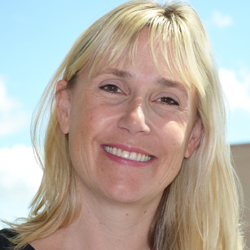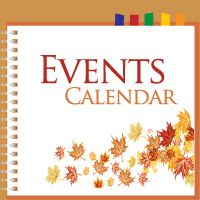In the Spotlight
Kathleen Klaasen, RN, MN, GNC(c)
 Kathleen has been a nurse for 21 years. During the second year of her undergraduate nursing education program, she was completing her gerontology placement and found her field of specialty, which she has continued to build upon. She has extensive experience in gerontology, having worked as a clinical nurse specialist, director of care and chief executive officer. Her most recent role is clinical nurse specialist for the Region's home care program, where she'll be involved in clinical consultation, evidence informed practice, education and research.
Kathleen has been a nurse for 21 years. During the second year of her undergraduate nursing education program, she was completing her gerontology placement and found her field of specialty, which she has continued to build upon. She has extensive experience in gerontology, having worked as a clinical nurse specialist, director of care and chief executive officer. Her most recent role is clinical nurse specialist for the Region's home care program, where she'll be involved in clinical consultation, evidence informed practice, education and research.
"Nurses are one of the most trusted professionals in the world. We need to wear that as a badge of honour."
What prompted you to pursue nursing? Did you pick it or did it pick you?
It picked me . . . one of my aunts who I'm very close with is a nurse. In looking at her interact with others, her knowledge, professionalism and caring, I knew I wanted to be like that.
Can you talk about your specialty?
I fell in love with gerontological nursing. Gerontological nursing allows me to practice to my full scope of practice. I love the challenge, the complexity of care, and the holistic, team based approach to care. I have learned so much from the older adults and their families I have had the privilege to work with over the course of my career.
What started your interest in Collaborative Care?
You can't provide care in gerontology or any other setting for that matter without a team. I love working as a member of a collaborative team. I have had the honour of working with extremely effective, high functioning teams but have also seen many struggling teams. I wanted to understand the best strategies and approaches to effective team work.
If there were one thing you wanted people to know about Collaborative Care from a nursing perspective, what would that be?
Nurses play a significant central role in health care teams in all settings - they are a key contributor. There is an opportunity to embrace our roles - as members of health care teams or leaders of health care teams - and there is an opportunity to practice to our full scope of practice as nurses.
Nurses bring a lot to the table. It's about focusing on the person you're working with. What do they need? How can I best meet their needs as a nurse? But it is also about respecting and acknowledging others on the team. Sometimes there are three or four people who can meet a specific need the person or group has. At those times, it can be about letting go and trusting in others.
Can you please talk about when scope of practice overlaps?
As health care providers, we need to focus on what makes the most sense for that person we're providing care for. There is always more than enough work for everybody.
As a nurse, portions of what I may do for a person, someone else can do that. That frees me up to do what I can uniquely offer as a nurse. For example, as a nurse I can absolutely provide education about medications. If a pharmacist on my team takes on the medication education with the patient, I can maximize on other practice areas which I can uniquely provide to the patient. It's about maximizing what I as a nurse can provide to that person.
Do you have any myths you'd like to debunk about nursing?
Nursing as a profession has done incredible work to debunk some of the traditional myths about nursing - for example that doctors make the orders and nurses simply follow them. Nurses are helping people understand the diversity of nursing roles, the breadth of experience and knowledge required about autonomous decision making.
I think sometimes people still associate nurses with hospitals. But the truth is you can find nurses everywhere - schools, work places, personal care homes, in the community and the military. There are endless opportunities for nurses to work in government, policy making and administrative roles. I don't think there's a setting I can think of where a nurse couldn't potentially have a role.
What are your reflections on nursing?
I'm honoured to be a nurse. Nurses are with individuals and their families at very vulnerable times. We're with them when they deliver a baby, we're with them when they receive a frightening diagnosis and we're with them when someone they love and cherish dies.
I am honoured and humbled to have the trust of people in sharing their story, their journey, what they bring, who they are. There's so much trust in doing that. Nurses are one of the most trusted professionals in the world. We need to wear that as a badge of honour.
What gets you out of bed in the morning?
It's an exciting thing to leap into something and make a positive difference. I'm particularly interested in how to use new research to improve care. It's exciting to look at how we can make a person's health care experience better.
It's also fun to hear about other exciting work that's being done in other parts of the health care system or across the country. We've all read about an amazing program and thought, how can we learn from that and implement it here? It is an exhilarating feeling to think of what is possible.
What are your thoughts on life/work balance?
Work/life balance is critical. You need to sustain your energy and move forward to create a positive difference. It's important to take time for your family. Going outside for fresh air, laughter, exercising, going to the lake, watching the sunset, holding my daughter's hand when we walk through the park . . . whatever brings me peace, I need to make time for.
I need to be healthy and feel grounded to have energy to share with others. Nurses touch lives every day. We're caregivers constantly providing care, giving education and supporting. We need to be healthy to do that.
Laughter is very important. I am often teased about my hearty laugh. But, laughter and having fun can really help break up the day and be a great stress reliever.
What has had a profound influence on your nursing practice?
Being a part of the EXTRA program has positively influenced my nursing practice. It's shown me the power of evidence, the power of outcomes has prompted me to ask how are we measuring things? Everything - the decisions we're making, the policies we're creating, the practice tools we're using - is informed by evidence.
That's really has changed me on a day to day level. When someone comes to me with a concern, the first question I now ask is what is the evidence here? Concerns, complaints and questions can be driven by assumptions or emotions. Looking at the evidence helps me lay out the facts so I can clarify what's the best approach or what I need to do next.
We quite often make decisions based on what we think, not what we actually know. I'm trying to make sure evidenced informed knowledge drives my practice and informs my decisions.
